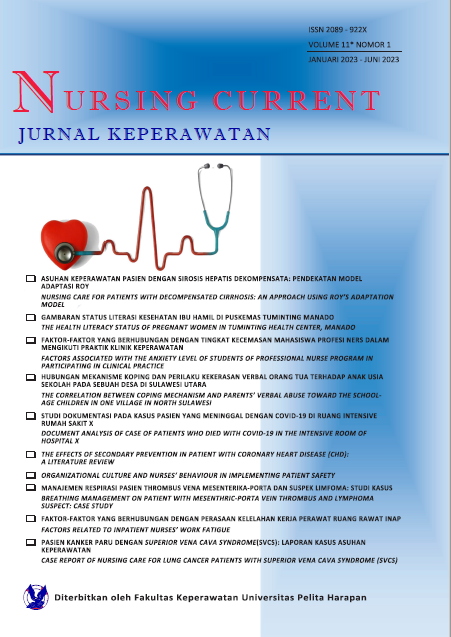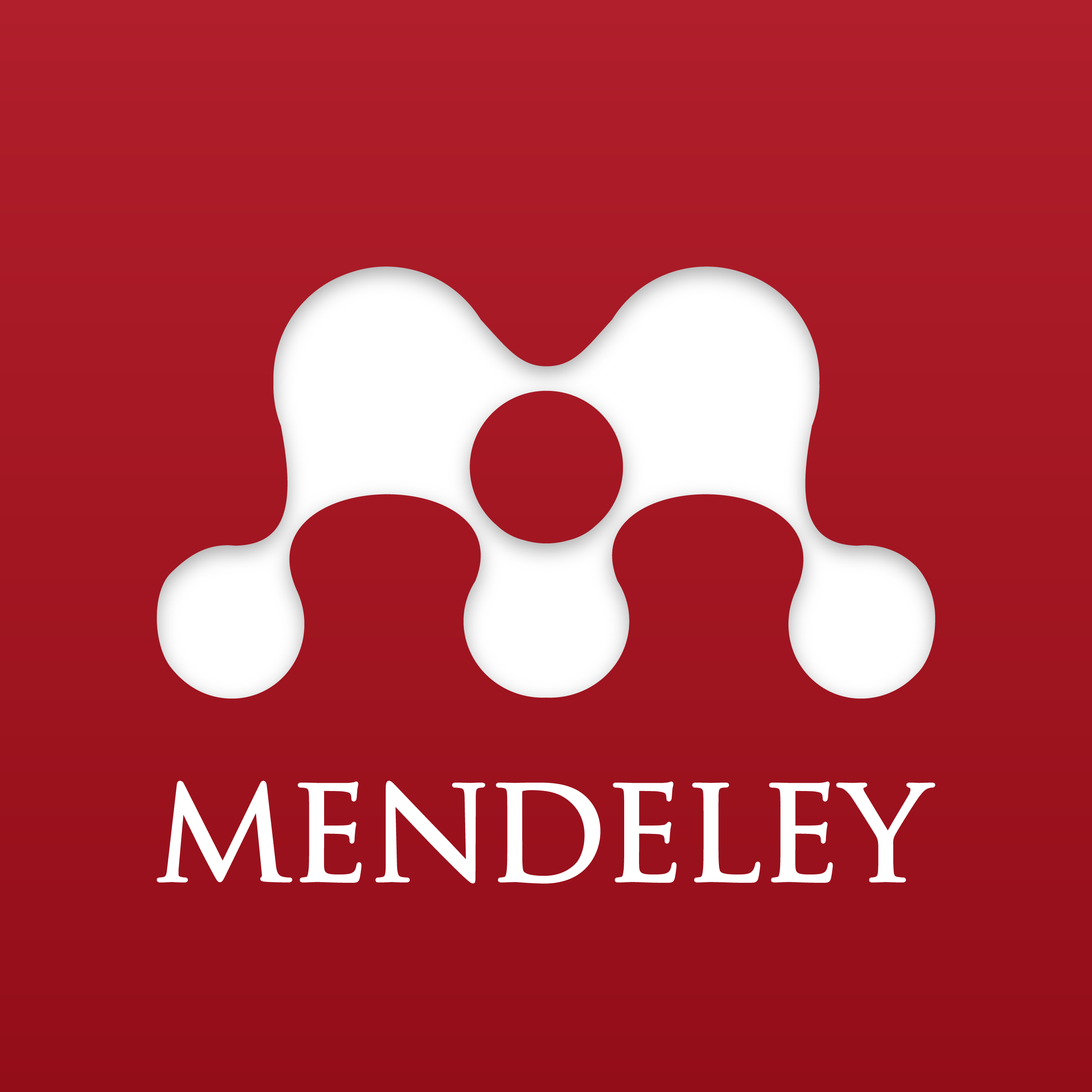HUBUNGAN MEKANISME KOPING DENGAN PERILAKU KEKERASAN VERBAL ORANG TUA TERHADAP ANAK USIA SEKOLAH PADA SALAH SATU DESA DI SULAWESI UTARA [The Relationship between Coping Mechanisms and Parents' Verbal Abuse with School Age Children in a Village in North Sulawesi]
DOI:
https://doi.org/10.19166/nc.v11i1.6950Keywords:
School-age children, verbal abuse, coping mechanism, parentsAbstract
Parents play a very big role in the life of their children, including their education. Good assistance during the school years will have an impact on children's development. Based on an initial survey conducted by researchers, it was shown that parents commit various forms of verbal abuse to school-age children when accompanying their children in studying. The purpose of this study was to determine the relationship between coping mechanisms and the verbal abuse behavior of parents towards school-age children in a village in North Sulawesi. This research method uses a correlational quantitative method with a cross sectional design. The population studied is parents who have school-age children in a village in North Sulawesi. Sampling in this study using a purposive sampling technique with a total of 50 respondents. The questionnaire used was the Brief Cope and the verbal violence questionnaire which was adapted from the Korean Verbal Abuse Questionnaire. Data analyzed using univariate and bivariate tests with the Spearman rho correlation test. The results obtained were that there was no relationship between coping mechanisms that focused on emotions and parental verbal violence (p-value = 0.461) and there was no relationship between problem-focused coping mechanisms and parental verbal violence against school-age children in one of the villages in North Sulawesi (p-value = 0.269). The recommendations from this study are that parents should have good knowledge of coping mechanisms and train their ability to control their emotions so that verbal abuse in children can be avoided.
BAHASA INDONESIA ABSTRAK Orang tua memiliki peran yang sangat besar dalam kehidupan anak, termasuk pendidikannya. Pendampingan yang baik selama masa sekolah akan berdampak pada perkembangan anak. Berdasarkan survei awal yang telah dilakukan oleh peneliti menunjukkan bahwa orang tua melakukan berbagai bentuk kekerasan verbal pada anak usia sekolah ketika mendampingi anaknya belajar. Tujuan penelitian ini yaitu untuk mengetahui hubungan mekanisme koping dengan perilaku kekerasan verbal orang tua terhadap anak usia sekolah pada salah satu desa di Sulawesi Utara. Metode penelitian ini menggunakan metode kuantitatif korelasional dengan desain cross sectional. Populasi yang diteliti yaitu orang tua yang memiliki anak usia sekolah pada salah satu desa di Sulawesi Utara. Pengambilan sampel pada penelitian ini menggunakan teknik purposive sampling dengan jumlah responden sebanyak 50 orang. Kuesioner yang digunakan yaitu Brief Cope dan kuesioner kekerasan verbal yang diadaptasi dari Korean Verbal Abuse Questionnaire. Data dianalisis menggunakan uji univariat dan bivariat dengan uji Spearman rho correlation. Hasil yang didapatkan yaitu tidak ada hubungan antara mekanisme koping yang berfokus pada emosi dengan kekerasan verbal orang tua (p-value = 0,461) dan tidak ada hubungan antara mekanisme koping yang berfokus pada masalah dengan kekerasan verbal orangtua terhadap anak usia sekolah pada salah satu desa di Sulawesi Utara (p-value = 0,269). Rekomendasi dari penelitian ini diharapkan orang tua sebaiknya memiliki pengetahuan yang baik tentang mekanisme koping dan melatih kemampuan dalam mengontrol emosi sehingga kekerasan verbal pada anak bisa dihindari.
References
Antu, M. ., Zees, R. F., & Nusi, R. (2023). Hubungan Kekerasan Verbal (Verbal Abuse) Orang Tua Dengan Tingkat Kepercayaan Diri Pada Remaja. Jurnal Ners, 7(1), 425-433. https://doi.org/10.31004/jn.v7i1.13530
Childress, S., Roberts, A., LaBrenz, C. A., Findley, E., Ekueku, M., & Baiden, P. (2023). Exploring the lived experiences of women with children during COVID-19: Maternal stress and coping mechanisms. Children and Youth Services Review, 145, 106775. https://doi.org/10.1016/j.childyouth.2022.106775
Farnia, V., Tatari, F., Moradinazar, M., Salemi, S., Juibari, T. A., Alikhani, M., Abdoli, N., & Golshani, S. (2020). Investigating the prevalence of child abuse in the families with addicted parents in Iran: With emphasis on family risk factors. Clinical Epidemiology and Global Health, 8(4), 1098-1103. https://doi.org/10.1016/j.cegh.2020.03.027
Indrayati, N., & PH, L. (2019). Gambaran Verbal Abuse Orangtua pada Anak Usia Sekolah. Jurnal Ilmu Keperawatan Anak, 2(1), 9-18. https://doi.org/10.32584/jika.v2i1.220
Lau, D. K., Agustina, V., & Setiawan, H. (2019). Gambaran Tingkat ansietas Dan Mekanisme koping Pada Mahasiswa Keperawatan dalam menghadapi Ujian Praktek Laboratorium. Jurnal Keperawatan Jiwa, 7(2), 215. https://doi.org/10.26714/jkj.7.2.2019.217-228
Lestari, S. P., Royhanaty, I., & Amah, E. S. L. (2018). Hubungan Perilaku Verbal Abuse Orang tua dengan Perilaku Bullying pada Anak Usia Sekolah. Jurnal Ilmiah Permas: Jurnal Ilmiah STIKES Kendal, 8(1), 63-66. http://journal.stikeskendal.ac.id/index.php/PSKM/article/view/197
Lewin, J. E., & Sager, J. K. (2009). An investigation of the influence of coping resources in Salespersons’ emotional exhaustion. Industrial Marketing Management, 38(7), 798-805. https://doi.org/10.1016/j.indmarman.2008.02.013
Liu, J., Yang, Y., Chen, J., Zhang, Y., Zeng, Y., & Li, J. (2022). Stress and coping styles among nursing students during the initial period of the clinical practicum: A cross-section study. International Journal of Nursing Sciences, 9(2), 222-229. https://doi.org/10.1016/j.ijnss.2022.02.004
Mahmud, B. (2020). Kekerasan Verbal pada Anak. AN-NISA : Jurnal Studi Gender dan Anak, 12(2), 689-694. https://jurnal.iain-bone.ac.id/index.php/annisa/article/view/667
Maree, J. G. (2021). The Psychosocial Development Theory of Erik Erikson: Critical overview. Early Child Development and Care, 191(7-8), 1107-1121. https://doi.org/10.1080/03004430.2020.1845163
Nurhayati, N., & Wahyuna, L. (2021). Hubungan mekanisme koping Orang Tua Dengan Dampak Hospitalisasi Pasca Operasi Pada Anak Prasekolah di Ruang Rawat inap raudhah 2 Blud Rsu Dr. Zainoel Abidin Banda Aceh. Jurnal SAGO Gizi Dan Kesehatan, 2(2), 191. https://doi.org/10.30867/gikes.v2i2.674
Rahmania, R., Nurwati, N., & Taftazani, B. M. (2016). Strategi koping Ibu Dengan Anak Gangguan spektrum autisme : (Studi Kasus: Orangtua Murid Taman Kanan-Kanak Mutiara Bunda). Prosiding Penelitian Dan Pengabdian Kepada Masyarakat, 3(3), 334. https://doi.org/10.24198/jppm.v3i3.13775
Rochmah, P. H., Rasni, H., & Nur, K. R. (2019). Hubungan mekanisme koping Dengan Kualitas Hidup Pada Klien diabetes melitus Tipe 2 di Wilayah Kerja Puskesmas Kaliwates-Jember. Pustaka Kesehatan, 7(2), 80. https://doi.org/10.19184/pk.v7i2.19119
Yalçın, V. (2021). Moral development in early childhood: Benevolence and responsibility in the context of children’s perceptions and reflections. Educational Policy Analysis and Strategic Research, 16(4), 140-163. https://doi.org/10.29329/epasr.2021.383.8
Downloads
Additional Files
Published
How to Cite
Issue
Section
License
Authors who publish with this journal agree to the following terms:
1) Authors retain copyright and grant the journal right of first publication with the work simultaneously licensed under a Creative Commons Attribution License (CC-BY-SA 4.0) that allows others to share the work with an acknowledgement of the work's authorship and initial publication in this journal.
2) Authors are able to enter into separate, additional contractual arrangements for the non-exclusive distribution of the journal's published version of the work (e.g., post it to an institutional repository or publish it in a book), with an acknowledgement of its initial publication in this journal.
3) Authors are permitted and encouraged to post their work online (e.g., in institutional repositories or on their website). The final published PDF should be used and bibliographic details that credit the publication in this journal should be included.

This work is licensed under a Creative Commons Attribution-ShareAlike 4.0 International License.






